|
Printables |
PowerPoints |
Online exercises |
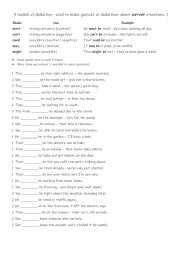
|
A2+-B1 5 modals of deduction - used to make guesses or deductions about current situations. 1
Students should learn modals of deduction because they are useful for expressing logical guesses or assumptions about present situations, helping speakers show how certain or uncertain they are. These modals, such as must, might, could, and can�t, make speech sound more natural and fluent, improve communication and reasoning skills, and are commo...
Level: elementary
Age: 10-100
Type:
Downloads: 100
|
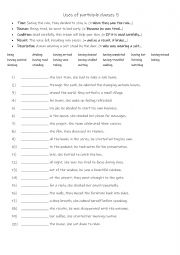
|
A2+-B1 5 uses of participle clauses 5
Students should learn the five uses of participle clauses because they help create more concise, fluid, and sophisticated sentences. These clauses allow for the expression of time, reason, condition, result, and description in a shorter, more efficient way, making writing and speaking more dynamic and less repetitive. For example, participle clause...
Level: elementary
Age: 10-100
Type:
Downloads: 114
|
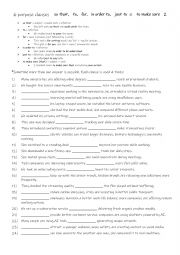
|
A2+-B1 6 clauses of purpose 2
First, students need to familiarise themselves with the 6 clauses of purpose and their formation. Then they read the sentences to see which one is suitable to complete the gap-fill. Each type is used 4 times! Answers on page 2.
Level: intermediate
Age: 10-100
Type:
Downloads: 103
|
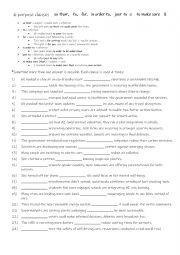
|
A2+-B1 6 clauses of purpose 3
First, students need to familiarise themselves with the 6 clauses of purpose and their formation. Then they read the sentences to see which one is suitable to complete the gap-fill. Each type is used 4 times! Answers on page 2.
Level: elementary
Age: 10-100
Type:
Downloads: 110
|
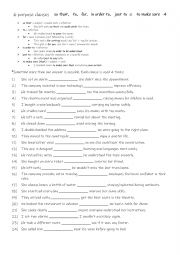
|
A2+-B1 6 clauses of purpose 4
First, students need to familiarise themselves with the 6 clauses of purpose and their formation. Then they read the sentences to see which one is suitable to complete the gap-fill. Each type is used 4 times! Answers on page 2.
Level: elementary
Age: 8-100
Type:
Downloads: 105
|
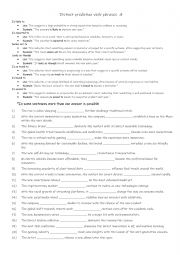
|
A2+-B1 7 Distinct prediction verb phrases 4
These phrases help express different levels of certainty about future events. "Is likely to" suggests something will probably happen based on evidence, while "is expected to" refers to something predicted or planned. "Seems set to" indicates something is prepared to happen soon, and "looks as though" is used when something seems probable based on c...
Level: elementary
Age: 9-100
Type: worksheet
Downloads: 145
|
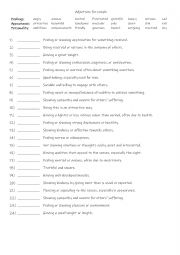
|
A2+-B1 8 adjectives for each - feelings - appearance and personality
Learning vocabulary for feelings, appearance, and personality enables clearer and more expressive communication. Words for emotions like "anxious" or "excited" help us convey our moods and understand others better, strengthening relationships. Descriptive terms for appearance, such as "slim" or "muscular," are useful for identifying people, setting...
Level: intermediate
Age: 8-100
Type:
Downloads: 112
|
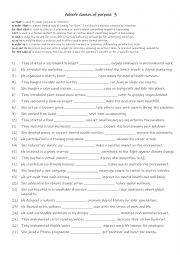
|
A2+-B1 9 adverb clauses of purpose 3
First, students need to familiarise themselves with the 9 adverbs and check their meaning. Then they read the sentences to see which one is needed to complete the sentence. Each word is used 3 times! Answers on page 2.
Level: elementary
Age: 9-100
Type:
Downloads: 110
|
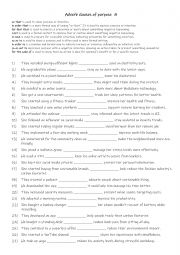
|
A2+-B1 9 adverb clauses of purpose 4
First, students need to familiarise themselves with the 9 adverbs and check their meaning. Then they read the sentences to see which one is needed to complete the sentence. Each word is used 3 times! Answers on page 2.
Level: elementary
Age: 9-100
Type:
Downloads: 121
|

|
A2+-B1 Adjective + preposition + gerund 4
Learning adjective + preposition + gerund is essential for natural and fluent English. These structures are common in everyday speech, writing, and exams. They help express ideas accurately, but since prepositions don�t always follow logical rules, mastering them prevents common mistakes and improves overall communication.
Level: elementary
Age: 10-100
Type:
Downloads: 138
|
|
|
|
|












